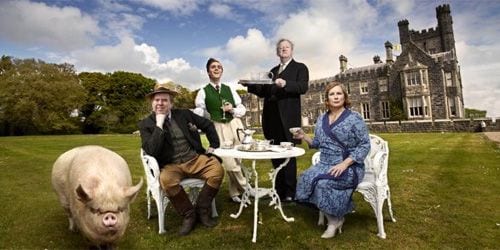
Blandings is BBC serial based on a series of books by PG Wodehouse. Wodehouse, of course, is known for his Jeeves and Wooster stories, but he wrote much more besides, and his stories set at Blandings Castle in the ’20s are as funny as anything else he ever wrote. Season One of Blandings consists of six half-hour episodes of unadulterated farce. They may, perhaps, lack the subversive wit and sophistication of the Jeeves stories, and they certainly aren’t for everyone—but my God, they’re funny.
In large measure this is due to the pitch-perfect portrayals by the actors involved. Timothy Spall, an actor best-known to American audiences, perhaps, for his role in The King’s Speech, is wet-your-pants hilarious as Lord Clarence Emsworth, a well-meaning and entirely idiotic aristocrat whose chief concern is the health and well-being of his pig, Empress. Lord Clarence is distracted, jolly and childlike; he also has difficulty retaining complex information such as the names of his children. He is a baby-faced innocent whose sweetness undercuts any perceived unfairness in his enormously privileged position. Spall plays him perfectly, peppering his speech with hesitations and uncertainties and sentences that trail off into nothingness.
Opposite Clarence is his shrewish sister Lady Connie, ably played by Jennifer Saunders. One criticism that could be made of the series is the way in which gender roles are rather tiresomely rehashed: Connie is the no-fun harpy who strives to keep Clarence in line, whether through threats, intimidation (always comic of course) or the hiring of “secretaries” to tidy up the hopeless disorganized Clarence. This is a fun subplot throughout the series, but it does mean that the bitchy sister is always breaking up the nice guy’s fun. This is a pattern that got old long ago.
Other cast members include Mark Williams as the longsuffering butler Beach, a not-quite-Jeeves figure who nonetheless is rather more on the ball than the master of the house, and whose elastic face manages to convey a wealth of expression with minimal words. Finally, Jack Farthing plays Clarence’s son Freddie, who takes after his father by being a dimwit of the first order. With his relentlessly “modern” ’20s slang and remarkable vapidity, Freddie serves as the motor for many of the series’ plot machinations. He’s also a funny, likeable fellow, despite his idiocy, who is taken for a ride by a young woman or two—echoes of that tiresome gender interplay mentioned above.
The fine performances allow one to overlook the absurdity of the characters, who are so far removed from reality that a nitpicking viewer might have difficulty suspending belief to the degree necessary to swallow the inane plots. It’s hard to imagine any man, even a landed British aristocrat of the era, being able to maintain his land and holdings while being as breathtakingly clueless as Lord Clarence; or any family being indulgent enough to buy a new motor car for their son every week after he smashes up the previous one (Freddie’s recurring auto wrecks, under different circumstances each time, is a recurring joke). Most viewers will be too busy laughing to worry about such things, but for some it may prove to be a deal-breaker.
The six episodes fly past; they are brief enough to take in in a sitting or two. The plots defy synopsis in their foolishness—there are deceptions and mistaken identities, petty feuds and much buffoonery, and everything works out all right in the end. There is no character development to speak of, so the pleasure in these shows comes from watching rich people acting foolishly. There would be no point in having them act otherwise.
Unlike many contemporary comedies, there is no attempt made to impart life lessons or any of that other balderdash: Lord Clarence is preoccupied with his pig to the point of obsession at the beginning of the first episode, and he remains so at the end of the second. (And, one suspects, will be in exactly the same state throughout Season Two, as well.) Young Freddie is a good-natured twit throughout the series, and remains not one iota smarter at the end of it, and so forth.
The DVD set is a bare-bones affair, with not an extra to be had, and that’s just fine. One really doesn’t need commentary tracks to point out the moments when we should laugh, or a behind-the-scenes look at the country estate where the series was shot. The episodes themselves are the point here, and they are entertaining as hell, and what else do you need?
Fans of British humor should certainly snap this one up. Viewers of Wodehouse’s other television adaptations should take a look as well; Blandings is slightly more slapstick and farcical than Jeeves and Wooster, but is nonetheless delightful in its own way. There are many, many worse ways to spend a few hours of one’s time than by watching silly people acting silly.

![Call for Papers: All Things Reconsidered [MUSIC] May-August 2024](https://www.popmatters.com/wp-content/uploads/2024/04/all-things-reconsidered-call-music-may-2024-720x380.jpg)



